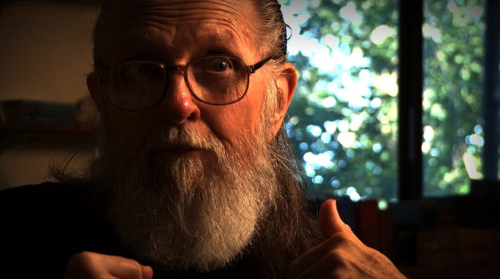Review: Incendiary: The Willingham Case

A potential pitfall of reviewing Incendiary: The Willingham Case is that rather than passing judgment on this engaging and enraging documentary, any critic with a desire for justice will instead pass judgment on the film's subject matter -- the infamous death penalty case of Cameron Todd Willingham.
The case began with the death of Willingham's three young daughters in a house fire in Corsicana, Texas in 1991. Willingham was home at the time of the fire. Despite his claims that he tried to save his daughters, he was charged with their murder by arson based on evidence suggesting someone had started the fire using a liquid accelerant.
Willingham was convicted of murder and sentenced to death in 1992, largely on the fire investigation evidence and the testimony of a jailhouse informant who said Willingham confessed to starting the fire. (The informant later recanted his testimony.) A psychiatrist also testified that Willingham, who had a minor criminal record, was an "extremely severe sociopath;" the psychiatrist later was expelled from the American Psychiatric Association for his questionable record.
Shortly before Willingham's scheduled execution in 2004, renowned arson expert Gerald Hurst found the arson evidence against Willingham to be faulty. Despite Hurst's findings, Willingham was denied clemency, and Texas Governor Rick Perry refused to grant a stay of execution. Willingham was executed despite numerous questions about the evidence used to convict him.
Since Willingham's execution, there have been persistent questions about the case and its political implications. A 2009 investigative report in the New Yorker suggested Willingham was innocent, and numerous arson experts agree that there is no evidence of arson. Perry has been accused of interfering with the investigation in various ways. (Willingham's case has been a source of controversy for nearly two decades, and my brief summary barely scratches the surface of the case's complexities and importance. For more information, refer to the Wikipedia article about the case.)
Again, there is a powerful temptation to pass judgment on the Willingham case while also reviewing Incendiary. So, bear with me and forgive me: As a political activist as well as a film critic, I must let this temptation get the better of me and venture into the often risky territory of political commentary. Based on the arson experts' findings, I think Willingham was the victim of a grotesque miscarriage of justice. And I think any reasonable person would reach the same conclusion. And Rick Perry? His actions are nothing less than an even more grotesque attempt to bury the inconvenient truth about Willingham. Signing off on the execution of an innocent person would not help his political career.
Okay, thanks for indulging me in my unabashedly political rant. Now, back to my regularly scheduled opinion of Incendiary.
With such emotionally and politically charged source material, it's little wonder that Incendiary is a powerhouse piece of filmmaking. Gripping, endlessly infuriating, and directed with great finesse by Austinites Steve Mims and Joe Bailey, Jr., Incendiary is documentary storytelling at its best. From its striking visuals to its thorough investigation of Willingham's story, the film is in many ways reminiscent of another stellar Texas crime documentary, Errol Morris's The Thin Blue Line.
Incendiary could be interpreted as siding entirely with Willingham, but a more accurate interpretation is that it sides entirely with the facts. Mims and Bailey interview several principals involved in the case, many of whom staunchly defend Willingham with scientific evidence. (In a shocking contrast, Willingham's trial attorney, David Martin, says he believes Willingham was guilty from the start. His opinion, needless to say, is based on wholly unscientific reasoning.)
Arson expert Hurst's frequent, well reasoned comments in the film are particularly devastating; he carefully explains the basics of how fires start and burn, methodically debunking every finding of the initial fire investigation. His professorial demeanor lends a balanced, thoughtful undertone to Incendiary; the film comes across as an entirely rational examination of Willingham's story, rather than a screeching anti-death penalty polemic.
As outrageous as Willingham's trial and fait accompli conviction are, the ensuing behavior of various politicians is far more maddening. Incendiary devotes much of its 99 minutes to what happened long after Willingham's execution, with gloriously incriminating footage of interviews with Rick Perry and other officials, along with startling fireworks at what should have been mundane state committee meetings.
Perry comes across as callous and unthinking, never doubting himself or the Texas criminal justice system even when presented with examples of wrongful convictions. Texas Forensic Science Commission chair (and Perry appointee) John Bradley presents himself as everything a public official shouldn't be -- abrupt, evasive and combative, telling off commission members and reporters alike. All this bravado and animosity makes for raucous, searing, first-rate documentary footage, proving the filmmakers' point that while the Willingham case should be all about science, it's mostly about politics.
Incendiary would be compelling enough as a documentary about one tragic story, but the film transcends the source material in many ways. Beyond documenting Willingham's life and the implications of his death, Incendiary is an indictment of American society's longstanding romance with (as Hurst calls it) anti-intellectualism. Time and again, the film shows us the mindset of those who believe Willingham to be guilty, from Perry's reference to "supposed experts" in fire investigation to Martin's I-know-what-I-know assumption that his client was guilty until proven innocent. Incendiary does not paint an encouraging portrait of American perceptions of truth and justice, much less science.
Riveting, flawlessly executed and painfully relevant, Incendiary is the sort of provocative documentary the Powers That Be don't want you to see. Which is all the more reason to see it.
Austin/Texas Connections: Incendiary: The Willingham Case was filmed in Texas and won the Louis Black Award at SXSW 2011. Mims and Bailey live in Austin.
You can also read Jenn Brown's review of the film from SXSW.

